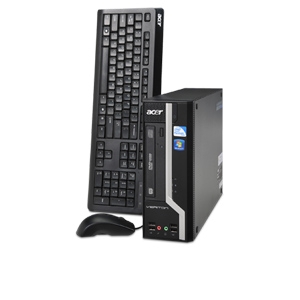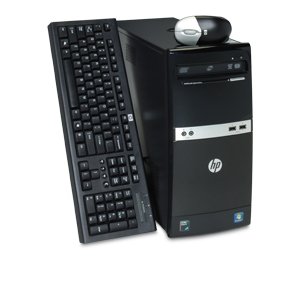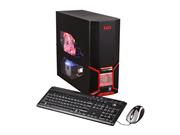Back To School Technology Buyer's Guide
by Zach Throckmorton on August 4, 2011 8:55 PM ESTRetail desktops
Component for component, retail desktops rarely offer as much value or flexibility as a comparable DIY desktop, especially if as a student you have access to heavily discounted OS licenses. However, retail desktops are often a good choice if the primary user is not especially tech-savvy. Retail desktops come with technical support and straightforward warranties. That is, they're potentially less of a headache in case something goes awry. When shopping for retail desktops, it is very important to shop around for remarkable sales. That said, we outline below what you can typically expect at four different price points.
Less than $300

At $300, retail desktops typically feature previous-generation CPUs, less than 4GB of memory, smaller hard drives, and integrated (i.e. non-gaming) graphics. That said, these very inexpensive PCs are still up to basic productivity tasks like web browsing and document creation, as well as sound and video playback. The Acer Veriton VX275-UD5800W is an example of such a computer. Its dual-core Intel Pentium E5800 processor is based on a CPU architecture that is now two generations old, it has 2GB of RAM, and a 320GB hard drive. It's an attractive choice for college students because it's tiny—16" deep by 4" wide by 11" tall. Its 4" width is a small desk footprint; it could easily be placed on a typical dorm room desk while leaving plenty of room for other items. Considering the very low cost of RAM, upgrading it to a more comfortable 4GB would cost less than $15.
Around $400

At $400, give or take, retail desktops start having good enough hardware that you can get four years of basic usage from them. Budget current-generation processors, 4GB RAM, smaller hard drives, and integrated graphics are typical in this price range. HP's 505B has specifications similar to the AMD micro-ATX system outlined on the previous page. The most important difference is the HP's PSU is 300W, and like most retail computer PSUs, it's likely not even capable of supplying that much electricity. The weak PSU severely limits this system's expandability in terms of adding more hard drives or a GPU. Also, the HP case is not nearly as attractive as the Fractal Core 1000! That said, it's a solid value at just over $400.
Around $500

As a long-time computer enthusiast, it truly amazes me how much power can be purchased for $500 today. At $500, lower mid-range CPUs, more than adequate 6GB or 8GB of memory, and large hard drives abound, though these systems usually lack discrete GPUs (if you're not gaming, this does not matter). The Gateway DX4850-45u is exactly $500, has a quad core Intel Core i5 CPU, 6GB DDR3, and a 1TB hard drive. This system is respectably powerful today, and it will be very serviceable in four years. Its chassis also includes a few niceties like easily-accessible media card readers and more than typical USB ports. Its optical drive not only reads and writes CDs and DVDs, it can also read Blu-ray discs. WiFi is integrated. Unfortunately it also includes an anemic 300W PSU, so upgrading it with anything more powerful than a low-end gaming GPU will require upgrading the power supply as well.
Around $700

At $700, retail PCs typically contain higher mid-range processors, 8GB RAM, large hard drives, and begin to include decent gaming GPUs. You usually get better bang for the buck at this point if you get away from the Dell and HP systems, where there's a major premium for decent graphics cards, and that's what we've selected here. CyberpowerPC's Gamer Xtreme 1314 houses the very capable Intel Core i5-2500K CPU, 8GB memory, a 1TB hard drive, and an AMD Radeon HD 6670 GPU. AnandTech reviewed the 6670 a few months ago and found it to be capable of producing acceptable frame rates (i.e. 30FPS or higher) in most games at resolutions less than 1080p and medium settings. The 6670 is not an enthusiast gamer's card, but it's okay for casual gamers, or hardcore gamers who like older titles (think World of Warcraft). Unfortunately, its motherboard will not facilitate overclocking the Core i5-2500K. Note that as the cost of the retail PC has risen on this page, so has its performance discrepency with the comparable DIY system. The Intel Core i5-2500K-based PC on the previous page has an enthusiast gamer-grade GPU, an SSD, a more feature-rich and overclockable motherboard, an aftermarket CPU heatsink for better overclocking results, and a much higher quality power supply for less than $100 more than this retail PC.
Now that we've covered both build your own and pre-built systems, the next page looks at what you'll actually be looking at: monitors.










94 Comments
View All Comments
Rick83 - Friday, August 5, 2011 - link
I would encourage a decent desktop, because a amount of working area and a full-size keyboard and mouse are not replaceable, and portability really is overvalued. I had exactly one laptop during my university days, it sucked and I never needed nor used it.Now, my 5 inch Tablet, that I use a lot, and my desktop, I wouldn't give that away for anything.
Really, in the end it's a matter of analyzing needs and wants.
A laptop usually just serves to distract you during lectures, a desktop is a trusty machine you can return to, and get serious work done, without being limited to those ridiculous 15" screens.
Currently have a work laptop - and guess what: I'm hating every minute of it, because the screen is crap, I have to put it on a cardboard box to get the screen to the proper ergonomic height, I can only plug in one external screen without a docking station, it's slow, soooo slow, because there's no SSD in it (and we're forced to run XP, which has horrible caching settings), it's loud when used hard, gets hot, and I have to kensington-lock it to the table. A proper silent tower and a set of screens is something that I return home to, full of anticipation.
So, don't get a laptop, because you think it's what's best. For the same money, you can get so much more usability out of a desktop, it's insane. And the screens, for gods sake, the screens.
Taft12 - Friday, August 5, 2011 - link
Someone needs to show you and your luddite buddy Chinoman the VGA port on you laptop that lets you use the big display that stays parked in your room (a USB port for the full-sized keyboard and mouse too!)AssBall - Friday, August 5, 2011 - link
That's funny, I remember having 2 CRTs, 2 full and one micro atx cases, and a 32 inch CRT TV with a stereo, playstation, n64 hooked up to it all fit fine in our 8x12 room (no we didn't throw out the beds lol).kepler - Friday, August 5, 2011 - link
Get a Windows laptop, half the price and it will work with anything you need it. 80% of Mac users end up having to install Windows to use SAS and other software anyway, let alone gaming consoles.Lots of Universities have 802.1x and have port security enabled for ethernet, which Apple doesn't allow connection sharing with, and consoles (which are undeniably popular) don't support.
Not to mention Apple has crap 802.1x profile managment in 10.6, and actually made it worse in 10.7.
Don't get things based on what you think other students will have, that is the absolutely retarded idea.
Just for some insight:
http://woody.typepad.com/files/windows_pc_vs_apple...
prdola0 - Friday, August 5, 2011 - link
It's obviously an Apple troll or a paid PR person. I live in Europe and have recently finished Bsc. and desktops are quite common. Also, I don't recall ever seeing a Mac of any kind - at least not where I lived (there were mostly electronics and computer sciences people).Zoomer - Friday, August 5, 2011 - link
Macs are rather popular in the computer science dept, but in engineering not so much. Many engineering apps don't run well on macs, and virtual machines may not work either as hardware interfacing is sometimes required.I had a friend go thinkpad + linux after his macbook pro's battery failed the second time.
steven75 - Friday, August 5, 2011 - link
Funny that you submit a troll picture as "insight."Ratman6161 - Friday, August 5, 2011 - link
Points:1. If your usage is primarily web based research, email, and typing term papers, the entire Mac Vs. PC Vs Linux flame ware is completely irrelevant. It does not matter what computer you buy, they will all do those tasks just fine.
2. It is about finding something that fits your needs and not what "75% of your classmates are using" The majority of your classmates will fit into point #1. But if you are an engineering or science type that needs to do modeling and simulation, mathematical analysis, etc you are going to want to find out what software your professors expect you to be using for those tasks and get a computer that will run that software. Likewise for any other more specialized area. What 75% of your classmates are using makes no difference if you are not performing the same work they do.
3. 75% of your classmates talked their parents into buying whatever tech they have. If you have to get a job and buy it yourself, the cost will suddenly become a much more important factor for you.
4. The people spending mom and dad's money rather than their own general got what they got because it was cool and the cost/benefit relationship was irrelevant to them.
SoCalBoomer - Friday, August 5, 2011 - link
I agree with you, techhhhhy, however I would not recommend anything less than 14 or 15" - just because working on a long paper on a tiny screen is maddening.Portability is good, but usability is still more important and a good size keyboard and monitor are extremely important since a student's life will be spent writing on this thing.
I also don't necessarily recommend a Macbook. If you're a Mac person, then definitely; but if you're a Windows person, then get a Windows machine. If you're on a budget, then think twice about a Macbook - not saying DON'T, just saying think twice. If you're going into certain fields, think about what you should get: some mandatory programs do not work on Macs (and yes, you can run Windows on Macs, but again, for MOST users I don't recommend it and it is more expensive than "just" a Windows laptop).
Again, I'm not recommending against a Mac. I'm recommending against the blanket recommendation FOR a Mac - I'm saying. . . "THINK" :D
I don't GO to college, but I run the student support arm of IT at a top ten liberal arts college so I do know something. . . well, maybe! LOL
Uritziel - Friday, August 5, 2011 - link
Anandtech needs an Amazon-like comment system, such that worthless posts like yours can be 'minus-ed' until they just show a subject line plus a "most people don't find this post contributes helpful information" -esque line.